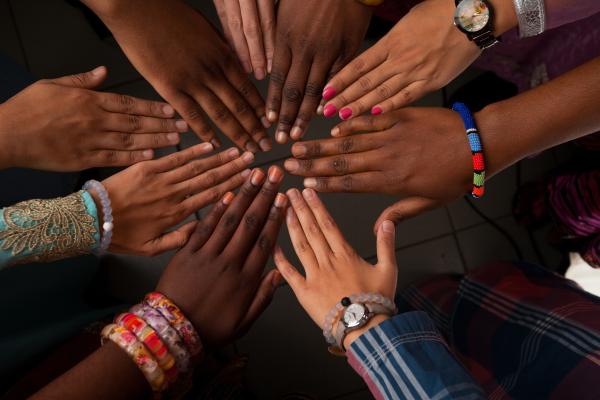التمويل اإلنساني للمنظمات والجمعات النسائية الوطنية / المحلية
يحدد هذا التقرير مجموعة من فرص التمويل للمنظمات الوطنية والمحلية المعنية بحقوق المرأة للمساعدة في منع العنف القائم على النوع الاجتماعي في حالات الطوارئ والاستجابة له.
 Our global Gender-Based Violence (GBV) team provides strategic technical support to actors across the GBV ecosystem from donors to community-level women-led organisations. We are a multi-disciplinary team delivering programme design and implementation support, advocacy, research reports, MEL and helpdesk services.
Our global Gender-Based Violence (GBV) team provides strategic technical support to actors across the GBV ecosystem from donors to community-level women-led organisations. We are a multi-disciplinary team delivering programme design and implementation support, advocacy, research reports, MEL and helpdesk services.
Our team aspires to apply our feminist principles in all our work and to support sustained and transformative change. We partner with diverse stakeholders and we take an intersectional approach to our work on GBV prevention and response across development and humanitarian contexts.
Our work includes primary prevention programming, community-level response to GBV and SEAH, school-related GBV, GBV in Emergencies, Technology-Facilitated GBV, Violence against LGBTQI+ communities, and GBV in Climate and Economic programming.
Read more about our current work or search our extensive GBV Resource Library below.
يحدد هذا التقرير مجموعة من فرص التمويل للمنظمات الوطنية والمحلية المعنية بحقوق المرأة للمساعدة في منع العنف القائم على النوع الاجتماعي في حالات الطوارئ والاستجابة له.
Este informe identifica una serie de oportunidades de financiación para que las organizaciones nacionales y locales de defensa de los derechos de la mujer ayuden a prevenir y responder a la violencia de género en situaciones de emergencia.
Gemma Ferguson is a Principal Consultant in the GBV team. She brings two decades of experience working at the intersection of media and social development, with a special focus on gender, social behaviour change and social norms programming.
This tip sheet highlights the importance of inclusion of older women in GBV in emergencies (GBViE) programming. It reviews key terms and concepts related to addressing the needs of older women; examines global data on aging women, and on GBV affecting older women; presents relevant frameworks and tools for improving response and prevention programming; and summarizes tools and resources for further advocacy and action.
This paper considers the question of whether feminist theories and principles hold the potential to help the humanitarian system better meet many of its highest priorities. Research across the world provides widespread evidence that feminism can benefit not just women and girls, but entire communities and societies. Already across the UN system, there are strong normative frameworks and rhetorical commitments to women’s rights and empowerment. Feminist principles are deeply embedded in UN conventions and guidance that are key to humanitarian response.
Beyond specific efforts to address GBV, this paper considers the question of whether feminist theories and principles hold the potential to help the humanitarian system better meet many other of its highest priorities. The paper begins with a basic primer on feminist theory—what it means, where it comes from, why it is useful, and what its core principles are.
This report examines how flooding, induced by climate change, disproportionately affects women and girls and increases their risk of experiencing GBV. The report has a particular focus on the Eastern and Southern Africa region. It identifies effective emergency preparedness and response strategies, particularly in the Eastern and Southern African region. It provides information that is useful to humanitarians, as well as development actors, working in flood-prone contexts.
This briefing note explores the complexities of using digital tools to make and collect reports of GBV cases. It is written for anyone engaged in developing, working with, or overseeing digital platforms for GBV, including managers, decision-makers, technology developers, and GBV practitioners. The information included in the note is based on a desk review of GBV guidelines, digital development principles, existing digital reporting tools, and codes of conduct.
Clare joined SDDirect as a Principal Consultant in the Gender-Based Violence team, with a specialism in GBV in Emergencies. She has a wealth of experience in NGOs, consultancy, donor governments and international organisations.